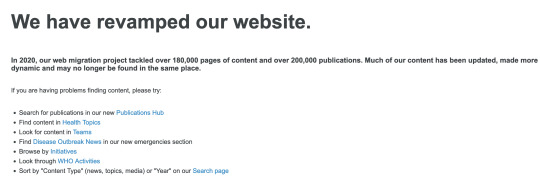#http 404
Link
Figure 1: TimeMap for the URL https://twitter.com/elonmusk/status/1675187969420828672On July 1...
#originaltags#archiving twitter#elon musk#http 404#internet archive#javascript#memento#tarannum zaki#twitter#twitter ui#wayback machine
0 notes
Text
Creating Routes in KoaJS - DZone Web Dev
Creating Routes in KoaJS – DZone Web Dev
KoaJS is a minimal and flexible NodeJS web application framework. It provides a good set of features for building web and mobile applications. In this post, we will be getting started with KoaJS by creating a small application.
KoaJS is an open-source framework. It is developed and maintained by the creators of the extremely popular ExpressJS.
However, the design philosophy behind KoaJS was…
View On WordPress
0 notes
Text

60 notes
·
View notes
Text
How to Fix 404 on AMP Pages After Deactivating the AMP Plugin
Accelerated Mobile Pages (AMP) have become a vital aspect of modern web development, significantly enhancing the loading speed and mobile-friendliness of web pages.
However, there are instances when website owners need to deactivate the AMP plugin for various reasons. One common issue that can arise after deactivating the AMP plugin is encountering 404 errors on previously functional AMP pages.…

View On WordPress
0 notes
Text

#Página 404 de MY LITTLE COMIC EG LEGEND OF EVERFREE#Canción: Macarthur Park#Artista: Donna Summer#Video Original: https://www.youtube.com/watch?v=VF_o7aSjl_E#EquestriaGirls#Dibujo#DigitalArt#EGLegendofEverfree#MyLittleComic#OC#SakuraCardCaptors#SakuraKinomoto
0 notes
Text
I guess it's real:
archive.is failing to get around the paywall, sorry. You can either register to read it for free, or read the pdf here. Feel free to reblog with a more permanent link: https://www.swisstransfer.com/d/e0b6eaf6-07d5-4a1e-a90c-50efd4f07157
Biggest takeaways are:
It's happening
There will be a switch to opt out
1K notes
·
View notes
Text
How to shatter the class solidarity of the ruling class

I'm touring my new, nationally bestselling novel The Bezzle! Catch me WEDNESDAY (Apr 11) at UCLA, then Chicago (Apr 17), Torino (Apr 21) Marin County (Apr 27), Winnipeg (May 2), Calgary (May 3), Vancouver (May 4), and beyond!

Audre Lorde counsels us that "The Master's Tools Will Never Dismantle the Master's House," while MLK said "the law cannot make a man love me, but it can restrain him from lynching me." Somewhere between replacing the system and using the system lies a pragmatic – if easily derailed – course.
Lorde is telling us that a rotten system can't be redeemed by using its own chosen reform mechanisms. King's telling us that unless we live, we can't fight – so anything within the system that makes it easier for your comrades to fight on can hasten the end of the system.
Take the problems of journalism. One old model of journalism funding involved wealthy newspaper families profiting handsomely by selling local appliance store owners the right to reach the townspeople who wanted to read sports-scores. These families expressed their patrician love of their town by peeling off some of those profits to pay reporters to sit through municipal council meetings or even travel overseas and get shot at.
In retrospect, this wasn't ever going to be a stable arrangement. It relied on both the inconstant generosity of newspaper barons and the absence of a superior way to show washing-machine ads to people who might want to buy washing machines. Neither of these were good long-term bets. Not only were newspaper barons easily distracted from their sense of patrician duty (especially when their own power was called into question), but there were lots of better ways to connect buyers and sellers lurking in potentia.
All of this was grossly exacerbated by tech monopolies. Tech barons aren't smarter or more evil than newspaper barons, but they have better tools, and so now they take 51 cents out of every ad dollar and 30 cents out of ever subscriber dollar and they refuse to deliver the news to users who explicitly requested it, unless the news company pays them a bribe to "boost" their posts:
https://www.eff.org/deeplinks/2023/04/saving-news-big-tech
The news is important, and people sign up to make, digest, and discuss the news for many non-economic reasons, which means that the news continues to struggle along, despite all the economic impediments and the vulture capitalists and tech monopolists who fight one another for which one will get to take the biggest bite out of the press. We've got outstanding nonprofit news outlets like Propublica, journalist-owned outlets like 404 Media, and crowdfunded reporters like Molly White (and winner-take-all outlets like the New York Times).
But as Hamilton Nolan points out, "that pot of money…is only large enough to produce a small fraction of the journalism that was being produced in past generations":
https://www.hamiltonnolan.com/p/what-will-replace-advertising-revenue
For Nolan, "public funding of journalism is the only way to fix this…If we accept that journalism is not just a business or a form of entertainment but a public good, then funding it with public money makes perfect sense":
https://www.hamiltonnolan.com/p/public-funding-of-journalism-is-the
Having grown up in Canada – under the CBC – and then lived for a quarter of my life in the UK – under the BBC – I am very enthusiastic about Nolan's solution. There are obvious problems with publicly funded journalism, like the politicization of news coverage:
https://www.theguardian.com/media/2023/jan/24/panel-approving-richard-sharp-as-bbc-chair-included-tory-party-donor
And the transformation of the funding into a cheap political football:
https://www.cbc.ca/news/politics/poilievre-defund-cbc-change-law-1.6810434
But the worst version of those problems is still better than the best version of the private-equity-funded model of news production.
But Nolan notes the emergence of a new form of hedge fund news, one that is awfully promising, and also terribly fraught: Hunterbrook Media, an investigative news outlet owned by short-sellers who pay journalists to research and publish damning reports on companies they hold a short position on:
https://hntrbrk.com/
For those of you who are blissfully distant from the machinations of the financial markets, "short selling" is a wager that a company's stock price will go down. A gambler who takes a short position on a company's stock can make a lot of money if the company stumbles or fails altogether (but if the company does well, the short can suffer literally unlimited losses).
Shorts have historically paid analysts to dig into companies and uncover the sins hidden on their balance-sheets, but as Matt Levine points out, journalists work for a fraction of the price of analysts and are at least as good at uncovering dirt as MBAs are:
https://www.bloomberg.com/opinion/articles/2024-04-02/a-hedge-fund-that-s-also-a-newspaper
What's more, shorts who discover dirt on a company still need to convince journalists to publicize their findings and trigger the sell-off that makes their short position pay off. Shorts who own a muckraking journalistic operation can skip this step: they are the journalists.
There's a way in which this is sheer genius. Well-funded shorts who don't care about the news per se can still be motivated into funding freely available, high-quality investigative journalism about corporate malfeasance (notoriously, one of the least attractive forms of journalism for advertisers). They can pay journalists top dollar – even bid against each other for the most talented journalists – and supply them with all the tools they need to ply their trade. A short won't ever try the kind of bullshit the owners of Vice pulled, paying themselves millions while their journalists lose access to Lexisnexis or the PACER database:
https://pluralistic.net/2024/02/24/anti-posse/#when-you-absolutely-positively-dont-give-a-solitary-single-fuck
The shorts whose journalists are best equipped stand to make the most money. What's not to like?
Well, the issue here is whether the ruling class's sense of solidarity is stronger than its greed. The wealthy have historically oscillated between real solidarity (think of the ultrawealthy lobbying to support bipartisan votes for tax cuts and bailouts) and "war of all against all" (as when wealthy colonizers dragged their countries into WWI after the supply of countries to steal ran out).
After all, the reason companies engage in the scams that shorts reveal is that they are profitable. "Behind every great fortune is a great crime," and that's just great. You don't win the game when you get into heaven, you win it when you get into the Forbes Rich List.
Take monopolies: investors like the upside of backing an upstart company that gobbles up some staid industry's margins – Amazon vs publishing, say, or Uber vs taxis. But while there's a lot of upside in that move, there's also a lot of risk: most companies that set out to "disrupt" an industry sink, taking their investors' capital down with them.
Contrast that with monopolies: backing a company that merges with its rivals and buys every small company that might someday grow large is a sure thing. Shriven of "wasteful competition," a company can lower quality, raise prices, capture its regulators, screw its workers and suppliers and laugh all the way to Davos. A big enough company can ignore the complaints of those workers, customers and regulators. They're not just too big to fail. They're not just too big to jail. They're too big to care:
https://pluralistic.net/2024/04/04/teach-me-how-to-shruggie/#kagi
Would-be monopolists are stuck in a high-stakes Prisoner's Dilemma. If they cooperate, they can screw over everyone else and get unimaginably rich. But if one party defects, they can raid the monopolist's margins, short its stock, and snitch to its regulators.
It's true that there's a clear incentive for hedge-fund managers to fund investigative journalism into other hedge-fund managers' portfolio companies. But it would be even more profitable for both of those hedgies to join forces and collude to screw the rest of us over. So long as they mistrust each other, we might see some benefit from that adversarial relationship. But the point of the 0.1% is that there aren't very many of them. The Aspen Institute can rent a hall that will hold an appreciable fraction of that crowd. They buy their private jets and bespoke suits and powdered rhino horn from the same exclusive sellers. Their kids go to the same elite schools. They know each other, and they have every opportunity to get drunk together at a charity ball or a society wedding and cook up a plan to join forces.
This is the problem at the core of "mechanism design" grounded in "rational self-interest." If you try to create a system where people do the right thing because they're selfish assholes, you normalize being a selfish asshole. Eventually, the selfish assholes form a cozy little League of Selfish Assholes and turn on the rest of us.
Appeals to morality don't work on unethical people, but appeals to immorality crowds out ethics. Take the ancient split between "free software" (software that is designed to maximize the freedom of the people who use it) and "open source software" (identical to free software, but promoted as a better way to make robust code through transparency and peer review).
Over the years, open source – an appeal to your own selfish need for better code – triumphed over free software, and its appeal to the ethics of a world of "software freedom." But it turns out that while the difference between "open" and "free" was once mere semantics, it's fully possible to decouple the two. Today, we have lots of "open source": you can see the code that Google, Microsoft, Apple and Facebook uses, and even contribute your labor to it for free. But you can't actually decide how the software you write works, because it all takes a loop through Google, Microsoft, Apple or Facebook's servers, and only those trillion-dollar tech monopolists have the software freedom to determine how those servers work:
https://pluralistic.net/2020/05/04/which-side-are-you-on/#tivoization-and-beyond
That's ruling class solidarity. The Big Tech firms have hidden a myriad of sins beneath their bafflegab and balance-sheets. These (as yet) undiscovered scams constitute a "bezzle," which JK Galbraith defined as "the magic interval when a confidence trickster knows he has the money he has appropriated but the victim does not yet understand that he has lost it."
The purpose of Hunterbrook is to discover and destroy bezzles, hastening the moment of realization that the wealth we all feel in a world of seemingly orderly technology is really an illusion. Hunterbrook certainly has its pick of bezzles to choose from, because we are living in a Golden Age of the Bezzle.
Which is why I titled my new novel The Bezzle. It's a tale of high-tech finance scams, starring my two-fisted forensic accountant Marty Hench, and in this volume, Hench is called upon to unwind a predatory prison-tech scam that victimizes the most vulnerable people in America – our army of prisoners – and their families:
https://us.macmillan.com/books/9781250865878/thebezzle
The scheme I fictionalize in The Bezzle is very real. Prison-tech monopolists like Securus and Viapath bribe prison officials to abolish calls, in-person visits, mail and parcels, then they supply prisoners with "free" tablets where they pay hugely inflated rates to receive mail, speak to their families, and access ebooks, distance education and other electronic media:
https://pluralistic.net/2024/04/02/captive-customers/#guillotine-watch
But a group of activists have cornered these high-tech predators, run them to ground and driven them to the brink of extinction, and they've done it using "the master's tools" – with appeals to regulators and the finance sector itself.
Writing for The Appeal, Dana Floberg and Morgan Duckett describe the campaign they waged with Worth Rises to bankrupt the prison-tech sector:
https://theappeal.org/securus-bankruptcy-prison-telecom-industry/
Here's the headline figure: Securus is $1.8 billion in debt, and it has eight months to find a financier or it will go bust. What's more, all the creditors it might reasonably approach have rejected its overtures, and its bonds have been downrated to junk status. It's a dead duck.
Even better is how this happened. Securus's debt problems started with its acquisition, a leveraged buyout by Platinum Equity, who borrowed heavily against the firm and then looted it with bogus "management fees" that meant that the debt continued to grow, despite Securus's $700m in annual revenue from America's prisoners. Platinum was just the last in a long line of PE companies that loaded up Securus with debt and merged it with its competitors, who were also mortgaged to make profits for other private equity funds.
For years, Securus and Platinum were able to service their debt and roll it over when it came due. But after Worth Rises got NYC to pass a law making jail calls free, creditors started to back away from Securus. It's one thing for Securus to charge $18 for a local call from a prison when it's splitting the money with the city jail system. But when that $18 needs to be paid by the city, they're going to demand much lower prices. To make things worse for Securus, prison reformers got similar laws passed in San Francisco and in Connecticut.
Securus tried to outrun its problems by gobbling up one of its major rivals, Icsolutions, but Worth Rises and its coalition convinced regulators at the FCC to block the merger. Securus abandoned the deal:
https://worthrises.org/blogpost/securusmerger
Then, Worth Rises targeted Platinum Equity, going after the pension funds and other investors whose capital Platinum used to keep Securus going. The massive negative press campaign led to eight-figure disinvestments:
https://www.latimes.com/business/story/2019-09-05/la-fi-tom-gores-securus-prison-phone-mass-incarceration
Now, Securus's debt became "distressed," trading at $0.47 on the dollar. A brief, covid-fueled reprieve gave Securus a temporary lifeline, as prisoners' families were barred from in-person visits and had to pay Securus's rates to talk to their incarcerated loved ones. But after lockdown, Securus's troubles picked up right where they left off.
They targeted Platinum's founder, Tom Gores, who papered over his bloody fortune by styling himself as a philanthropist and sports-team owner. After a campaign by Worth Rises and Color of Change, Gores was kicked off the Los Angeles County Museum of Art board. When Gores tried to flip Securus to a SPAC – the same scam Trump pulled with Truth Social – the negative publicity about Securus's unsound morals and financials killed the deal:
https://twitter.com/WorthRises/status/1578034977828384769
Meanwhile, more states and cities are making prisoners' communications free, further worsening Securus's finances:
https://pluralistic.net/2024/02/14/minnesota-nice/#shitty-technology-adoption-curve
Congress passed the Martha Wright-Reed Just and Reasonable Communications Act, giving the FCC the power to regulate the price of federal prisoners' communications. Securus's debt prices tumbled further:
https://www.govtrack.us/congress/bills/117/s1541
Securus's debts were coming due: it owes $1.3b in 2024, and hundreds of millions more in 2025. Platinum has promised a $400m cash infusion, but that didn't sway S&P Global, a bond-rating agency that re-rated Securus's bonds as "CCC" (compare with "AAA"). Moody's concurred. Now, Securus is stuck selling junk-bonds:
https://www.govtrack.us/congress/bills/117/s1541
The company's creditors have given Securus an eight-month runway to find a new lender before they force it into bankruptcy. The company's debt is trading at $0.08 on the dollar.
Securus's major competitor is Viapath (prison tech is a duopoly). Viapath is also debt-burdened and desperate, thanks to a parallel campaign by Worth Rises, and has tried all of Securus's tricks, and failed:
https://pestakeholder.org/news/american-securities-fails-to-sell-prison-telecom-company-viapath/
Viapath's debts are due next year, and if Securus tanks, no one in their right mind will give Viapath a dime. They're the walking dead.
Worth Rise's brilliant guerrilla warfare against prison-tech and its private equity backers are a master class in using the master's tools to dismantle the master's house. The finance sector isn't a friend of justice or working people, but sometimes it can be used tactically against financialization itself. To paraphrase MLK, "finance can't make a corporation love you, but it can stop a corporation from destroying you."
Yes, the ruling class finds solidarity at the most unexpected moments, and yes, it's easy for appeals to greed to institutionalize greediness. But whether it's funding unbezzling journalism through short selling, or freeing prisons by brandishing their cooked balance-sheets in the faces of bond-rating agencies, there's a lot of good we can do on the way to dismantling the system.

If you'd like an essay-formatted version of this post to read or share, here's a link to it on pluralistic.net, my surveillance-free, ad-free, tracker-free blog:
https://pluralistic.net/2024/04/08/money-talks/#bullshit-walks

Image:
KMJ (modified)
https://commons.wikimedia.org/wiki/File:Boerse_01_KMJ.jpg
CC BY-SA 3.0
https://creativecommons.org/licenses/by-sa/3.0/deed.en
#pluralistic#shorts#short sellers#news#private equity#private prisons#securus#prison profiteers#the bezzle#anything that cant go on forever eventually stop#steins law#hamilton nolan#Platinum Equity#American Securities#viapath#global tellink#debt#jpay#worth rises#insurance#spacs#fcc#bond rating#moodys#the appeal#saving the news from big tech#hunterbrook media#journalism
763 notes
·
View notes
Text
General http error: 404 not found http error: 404


Note: This fix will be included in our upcoming Service Pack release. Now, no any error message can be seen while execution. Once installed, open the Visual Studio and continue. Run the downloaded extension by double clicking the new VSIX, and install it.Ħ. Download the new VSIX for the Visual Studio 2013.ĥ. In case you are not able to uninstall, open the Visual Studio in the admin mode, and try to uninstall the VSIX.įigure 1: Uninstalling the Syncfusion Project TemplatesĤ. Select the, and uninstall by clicking the uninstall button. From your Visual Studio 2013, navigate to the Tools->Extension and Updates.Ģ. So we have modified our Project Templates and you can install the new VSIX using the below steps.ġ. So we are suspected that this issue occurred since the Project Templates not compatible with VS 203 update 4 since this issue occurred in Visual Studio 2013 update 4 inconsistently. We have created the Project Templates from Visual Studio 2013 only. If still you face the problem, please provide more information regarding this, so that we could analyze and provide a solution at the earliest. If you use form in your application, then better to remove the method attribute instead of set that value to “get”. You can increase the maxQueryString attribute value in the in. The following methods are other possible ways to resolve this error.

But there may be other reasons which could be the cause of this problem. The KB article provided in our website is just one of the possible way to rectify the windows authentication error. Which version of Syncfusion assemblies are you using?Īre you creating your project using Syncfusion template?Īre you unable to run your application after adding Syncfusion MVC assemblies? Could you please provide answers for the following queries? We are unable to identify your problem from the provided information. Thanks for contacting syncfusion support,

0 notes
Text
The request failed with http status 404 not found



Example values include Invalid argument, Login required, and Required parameter: project.Įxample values include invalid, invalidParameter, and required.ĭescription of the error. Example values include header and parameter.ĭescription of the error. For example, if you specify an invalid value for a parameter, the locationType will be parameter and the location will be the name of the parameter. The location or part of the request that caused the error. Example values include: Authorization, project, and projection. For example, if you specify an invalid value for a parameter, the location will be the name of the parameter.

The specific item within the locationType that caused the error. The HTTP 404, 404 not found, 404, 404 error, page not found or file not found error message is a hypertext transfer protocol (HTTP) standard response code. Example values include: 400 (Bad Request), 401 (Unauthorized), and 404 (Not Found). Posted: Team Foundation Server - General, the request failed with http status 404 Top Were you able to get it working I assume that the failure actually is the NTLM issue in my first post. ElementĪn HTTP status code value, without the textual description. Description: An unhandled exception occurred during the execution of the current web request. Fields should be used together to help determine the problem.Īlso, the example values given below are meant for illustration and are not anĮxhaustive list of all possible values. The request failed with HTTP status 404: Not Found. The following table describes the elements that can appear in the response body This is an example of an error response you receive if you try to list theīuckets of a non-existent project or one in which you don't have permissionĬreate a bucket using the name of a bucket you already own. List the buckets for a project but do not provide an authorization header. To see if it’s worked, try to access an unavailable webpage and hopefully the error 404 message should appear in the browser. The error page will be generated with this code. The following is an example of an error response you receive if you try to htaccess file (or create one if needed) in the root directory, enter this in ' ErrorDocument 404 /404.html ' and save the change. Save money with our transparent approach to pricing Managed Service for Microsoft Active Directory HTTP status codes and how to use them in RESTful API or Web Services. Rapid Assessment & Migration Program (RAMP) Hybrid and Multi-cloud Application PlatformĬOVID-19 Solutions for the Healthcare Industry
Integration with Google Cloud Platform services and toolsĭiscover why leading businesses choose Google Cloud.

1 note
·
View note
Text
Python: urllib.error.HTTPError: HTTP Error 404: Not Found
So apparently the default display number of questions per page is 50 so the range you defined in the loop goes out of the available number of pages with 50 questions per page. The range should be adapted to be within the number of total pages with 50 questions each.
This code will catch the 404 error which was the reason you got an error and ignore it just in case you go out of the range.
0 notes
Text
bufibifage.tumblr.com/post/692289978300088320/sport-elec-pro-mode-demploi-lave-vaisselle, https://labufibifage.tumblr.com/post/692289829061443584/s-automatiques, https://morediriva.tumblr.com/post/692290251897651200/chargeur-de-battery-voiture-mode-demploi-machine.
#http://vk.cc/c7jKeU#nofollow#_blank#<p> </p><p> </p><center>GROHE BLUE NOTICE >> <strong><u><a href= rel= target=>DOWNLOAD LIN#<br> grohe blue pure#<br> grohe blue recharge#<br> grohe blue home installation manual#<br> grohe blue home kitgrohe blue gaz#<br> grohe blue home code ec#<br> grohe blue professionnel#<br>#<br> </p><p> </p><p> </p><p>Visionnez la vidéo d'instructions par étape pour l'installation de votre système d'eau GROHE Blue Pro#GROHE Blue HOME 31 454 plumbing product pdf manual download. Service Panne Cause L'eau ne s'écoule pas • Le filtre n'est pas correctement i#l'unité réfrigérante de GROHE Blue Home se trouvera une place idéale et discrète au sein de votre cuisine.#Une notice d'instruction pour le remplacement de la bouteille de CO2 est disponible sur notre site web. Le robinet GROHE Blue ne fournit pa#L'application. GROHE Ondus vous enverra aussi une notification. Où puis-je me procurer des filtres ainsi que des bouteilles de CO2 ? Retrou#The control unit of the GROHE Blue® fitting is set for operation with the 600 liter filter cartridge (Prod no.: 40 404 001) at the factory.#</p><br>https://cukanosogon.tumblr.com/post/692290376805007360/la-restauration-collective-pdf-download#https://morediriva.tumblr.com/post/692290251897651200/chargeur-de-battery-voiture-mode-demploi-machine#https://la
0 notes
Text
hey hold on a sec

I just realized both op and the commenter are insane trad christains so im deleting my reblog (because im not platforming their shit -- this is ALSO why im censoring their URLs I’m not going to give them traffic) and instead reposing it with the following links/information:
1) The WHO still actively hosts a guide on how to create safe milk substitutes when access to breastmilk/milk substitutes are unavailable on the Institutional Repository for Information Sharing (iris). The guide is called “Infant Feeding in Emergencies: A Guide for Mothers”. Relevant information starts on page 38.
2) Here is a link to the archived guide WITH THE CAUTION that I was not able to find out why its no longer provided by the WHO or iris. It could be that the information is out of date. I am only sharing it because I think the visuals may be helpful for people who have trouble reading written directions. Consult the above link first, then refer to this guide only if you need clarification on how to perform certain actions. Link to archive.
3) The language in that second comment throws up so may red flags. I cropped it to only the information needed to understand the context of this post because I find it immensely suspect. The repeated allusions to 2020 for no apparent reason (but I can guess why, as an infection disease scientist) come across as loaded or dog-whistely. I would advise against sharing the OP for that reason. But because the information being provided is important and not well known, I’m making this alternative post for people to reblog.
4) The implication that the WHO is censoring information based on a 404 page is a really flimsy and extreme conclusion to jump to. The “Infant Feeding in Emergencies” guide I linked above also goes to a 404 page on the WHO’s main website - but again, can be accessed through iris instead. So no, the information on how to feed infants in a food crisis is not being censored by the WHO.
5) A more likely cause for the guide disappearing is that the link broke and they didn’t fix it. If you look at the original URL it indicates the guide was posted in a subcategory on the WHO’s website about International Crises, specifically in the Middle East. If you try to type in a shortened versions of that URL (specifically https://www.who.int/hac/crises/ or the slightly modified http://www.who.int/hac/crises/en/) you’ll see that the subdomain that was present with relevant info breaks around 2020. In fact, while testing this hypothesis, I came across this information page in a November 2021 version of the URL https://www.who.int/home/cms-decommissioning (which I was redirected to automatically from http://www.who.int/hac/crises/en/):

There is no nefarious conspiracy theory. The link simply broke - as many many many many links do on the internet. The second commenters reply is proven bunk by a little bit of fact checking.
sorry for the long post, but I think the information on infant nutrition substitutes is genuinely useful, lifesaving info -- but i’m not going to give more people with dangerous ideological views spouting nonsense a platform.
update (5/20/22):
I had hope this was a given, but I want to be explicitly clear.
Using an at-home formula substitute should be a last resort. Contact your infant’s physician or a pediatrician before attempting to make your own milk substitute.
I am also going to leave a link to the Academy of Breastfeeding Medicine’s statement on breast milk substitute shortages.
Do not blindly follow internet posts in regards to the health of yourself or your children. I wanted to share this post simply because I, myself, did not even know it was possible to make milk substitutes and thought it was useful to be aware of in an time when access to substitutes is unprecedentedly difficult.
#breast milk#mothers#mom#infant care#baby#formula#<-- sorry for the weird tags but i want to make sure this is accessible to ppl who would benefit most#pls share this instead of the other post btw#if you want the URLs i censored to block them just shoot me an ask
9K notes
·
View notes
Text

♬♪ .. living,retro computer id pack﹙for anonymous ﹚♯ predominantly androgynous.

names ⇢ lovebytes,calware,malakai,halware,atari,AM,wheatley,chip,malwaria,micah,mickey,hal,zip,zap,tessa,tecca,emoticon﹙emoticonnie﹚,bailey,sean,cursor,pascal,cache,java﹙javascript﹚,data,click﹙clicky,clickie,clicker﹚,myspace,wirehead,whirr,solitaire,paige,peyton﹙payton﹚,electronica,talia﹙digitalia﹚,fax,circe,programatha,juno,will
pronouns ⇢ it its,bit byte,beep boop,click clack,key keys keyboard,whirr whirrs,pix pixel pixelated,CPU CPUs,compute computer,route router,win windows,sentient sentience,wire wires wired,err error,pro program programmed,soft software,hard hardware,cir circuit circuitboard,click scroll,404 404s,404 page not found,^_^ ^_^s,:-) :-D,o_o >_>,🔌 🔌s,💻 💻s,🖥 🖥s,⌨ ⌨s,🖱 🖱s,💽 💽s,💾 💾s,💿 💿s,📀 📀s,🔇 🔊
titles ⇢ the man﹙woman,girl,boy,gal,guy,being,thing﹚in the machine,the one behind your screen﹙The one behind your LCD screen﹚,_ who is running on flash﹙can be replaced with any software﹚,_ technological form,_ wires,__ with a circuitboard in place of _ brain,ms. paint,__ plugged into the wall,your mechanical﹙technological,electronic﹚best friend
ids ⇢ Aiwarix,Vietechxic,Digitalbeing,Technobodiment,8bitgender,Technoperspeque,Girlvirtual,Nonbinaryvirtual,Boyvirtual,Virualors,Oldcomputic,Win10gender,Byteic,Aithing,Dynirusic,Digirealgender
users ⇢ Lovebytez,﹙name﹚-﹙4-digit number﹚,0100000101001101,7653r70¹,hi-040405,computers-cant-byte,machinery-and-me,35784m5¹,circuitboard4brains,malwaria,b-i-n-a-r-y,c-i-r-c-u-i-t,https-﹙name﹚-dot-com,thinking-in-1s-and-0s,1s-and-0s-and-1s,benevolentware,wifiwifey,pluginbestfriend,pluginplaything
¹ Combining random numbers and letters can be used to make more usernames like this.

#✦ ˓ whiskey .#⤷ on the rocks.#id pack#npt#npt pack#npt ideas#npt list#npts#npt suggestions#nputs#nput
324 notes
·
View notes
Note
While we're talking about secondary players, what about Grandma? Did you see that there was a drop in his business? BWF published a standard text on IG, worthy of being on LinkedIn leaving the company. This partnership didn't really last long...
Dear BWF Anon,
BWF did not publish anything in its own name. Bourbon With Friends (BWF) is just Paul Novielli and Connor Gilbert's podcast. But it is certainly Paul Novielli who jumped boat out of Grandma's BBB (Big Booze Business) project, three days ago, after one year and one month of serving as its CEO and co-founder.
With this statement, released on both Instagram and LinkedIn:

If you ask me, I'd say the 'reflecting on a journey' and the need (itch?) to release a 'Farewell Message' (almost in spite of something and someone) have such a passive-aggressive undertone, that it would be very easy to conclude the 'don't forget to write' part happened in bitterness and perhaps even a tiny bit of drama-drama. Here's a clearly frustrated chap, whose efforts might have remained unacknowledged. And whose suggestions might have been vertically filed into the dustbin, before he decided enough is enough and time has come to look for better pastures.
Why am I such a nosey woman and suspect this also might have something to do with Lady McGrandma, French Influencer Extraordinaire?
At any rate, McGrandma didn't like, didn't comment and promptly fubar'd the Team page of the BBB's website, which is now a wonderful 404 digital cul-de-sac:

As Novielli was an Executive Bourbon Steward by the Kentucky-based Stave & Thief Society (https://moonshineuniversity.com/introducing-the-stave-thief-society/), some of the brand's cachet was lost, or at least dented.
Interesting. Let's see what gives. It smells like a resounding flop, yet tempted as I might be, it's too early to determine exactly what that means, long term.
Thanks, Anon. We'll see and I'll keep an eye.

80 notes
·
View notes
Text
Too big to care

I'm on tour with my new, nationally bestselling novel The Bezzle! Catch me in BOSTON with Randall "XKCD" Munroe (Apr 11), then PROVIDENCE (Apr 12), and beyond!

Remember the first time you used Google search? It was like magic. After years of progressively worsening search quality from Altavista and Yahoo, Google was literally stunning, a gateway to the very best things on the internet.
Today, Google has a 90% search market-share. They got it the hard way: they cheated. Google spends tens of billions of dollars on payola in order to ensure that they are the default search engine behind every search box you encounter on every device, every service and every website:
https://pluralistic.net/2023/10/03/not-feeling-lucky/#fundamental-laws-of-economics
Not coincidentally, Google's search is getting progressively, monotonically worse. It is a cesspool of botshit, spam, scams, and nonsense. Important resources that I never bothered to bookmark because I could find them with a quick Google search no longer show up in the first ten screens of results:
https://pluralistic.net/2024/02/21/im-feeling-unlucky/#not-up-to-the-task
Even after all that payola, Google is still absurdly profitable. They have so much money, they were able to do a $80 billion stock buyback. Just a few months later, Google fired 12,000 skilled technical workers. Essentially, Google is saying that they don't need to spend money on quality, because we're all locked into using Google search. It's cheaper to buy the default search box everywhere in the world than it is to make a product that is so good that even if we tried another search engine, we'd still prefer Google.
This is enshittification. Google is shifting value away from end users (searchers) and business customers (advertisers, publishers and merchants) to itself:
https://pluralistic.net/2024/03/05/the-map-is-not-the-territory/#apor-locksmith
And here's the thing: there are search engines out there that are so good that if you just try them, you'll get that same feeling you got the first time you tried Google.
When I was in Tucson last month on my book-tour for my new novel The Bezzle, I crashed with my pals Patrick and Teresa Nielsen Hayden. I've know them since I was a teenager (Patrick is my editor).
We were sitting in his living room on our laptops – just like old times! – and Patrick asked me if I'd tried Kagi, a new search-engine.
Teresa chimed in, extolling the advanced search features, the "lenses" that surfaced specific kinds of resources on the web.
I hadn't even heard of Kagi, but the Nielsen Haydens are among the most effective researchers I know – both in their professional editorial lives and in their many obsessive hobbies. If it was good enough for them…
I tried it. It was magic.
No, seriously. All those things Google couldn't find anymore? Top of the search pile. Queries that generated pages of spam in Google results? Fucking pristine on Kagi – the right answers, over and over again.
That was before I started playing with Kagi's lenses and other bells and whistles, which elevated the search experience from "magic" to sorcerous.
The catch is that Kagi costs money – after 100 queries, they want you to cough up $10/month ($14 for a couple or $20 for a family with up to six accounts, and some kid-specific features):
https://kagi.com/settings?p=billing_plan&plan=family
I immediately bought a family plan. I've been using it for a month. I've basically stopped using Google search altogether.
Kagi just let me get a lot more done, and I assumed that they were some kind of wildly capitalized startup that was running their own crawl and and their own data-centers. But this morning, I read Jason Koebler's 404 Media report on his own experiences using it:
https://www.404media.co/friendship-ended-with-google-now-kagi-is-my-best-friend/
Koebler's piece contained a key detail that I'd somehow missed:
When you search on Kagi, the service makes a series of “anonymized API calls to traditional search indexes like Google, Yandex, Mojeek, and Brave,” as well as a handful of other specialized search engines, Wikimedia Commons, Flickr, etc. Kagi then combines this with its own web index and news index (for news searches) to build the results pages that you see. So, essentially, you are getting some mix of Google search results combined with results from other indexes.
In other words: Kagi is a heavily customized, anonymized front-end to Google.
The implications of this are stunning. It means that Google's enshittified search-results are a choice. Those ad-strewn, sub-Altavista, spam-drowned search pages are a feature, not a bug. Google prefers those results to Kagi, because Google makes more money out of shit than they would out of delivering a good product:
https://www.theverge.com/2024/4/2/24117976/best-printer-2024-home-use-office-use-labels-school-homework
No wonder Google spends a whole-ass Twitter every year to make sure you never try a rival search engine. Bottom line: they ran the numbers and figured out their most profitable course of action is to enshittify their flagship product and bribe their "competitors" like Apple and Samsung so that you never try another search engine and have another one of those magic moments that sent all those Jeeves-askin' Yahooers to Google a quarter-century ago.
One of my favorite TV comedy bits is Lily Tomlin as Ernestine the AT&T operator; Tomlin would do these pitches for the Bell System and end every ad with "We don't care. We don't have to. We're the phone company":
https://snltranscripts.jt.org/76/76aphonecompany.phtml
Speaking of TV comedy: this week saw FTC chair Lina Khan appear on The Daily Show with Jon Stewart. It was amazing:
https://www.youtube.com/watch?v=oaDTiWaYfcM
The coverage of Khan's appearance has focused on Stewart's revelation that when he was doing a show on Apple TV, the company prohibited him from interviewing her (presumably because of her hostility to tech monopolies):
https://www.thebignewsletter.com/p/apple-got-caught-censoring-its-own
But for me, the big moment came when Khan described tech monopolists as "too big to care."
What a phrase!
Since the subprime crisis, we're all familiar with businesses being "too big to fail" and "too big to jail." But "too big to care?" Oof, that got me right in the feels.
Because that's what it feels like to use enshittified Google. That's what it feels like to discover that Kagi – the good search engine – is mostly Google with the weights adjusted to serve users, not shareholders.
Google used to care. They cared because they were worried about competitors and regulators. They cared because their workers made them care:
https://www.vox.com/future-perfect/2019/4/4/18295933/google-cancels-ai-ethics-board
Google doesn't care anymore. They don't have to. They're the search company.

If you'd like an essay-formatted version of this post to read or share, here's a link to it on pluralistic.net, my surveillance-free, ad-free, tracker-free blog:
https://pluralistic.net/2024/04/04/teach-me-how-to-shruggie/#kagi
#pluralistic#john stewart#the daily show#apple#monopoly#lina khan#ftc#too big to fail#too big to jail#monopolism#trustbusting#antitrust#search#enshittification#kagi#google
430 notes
·
View notes